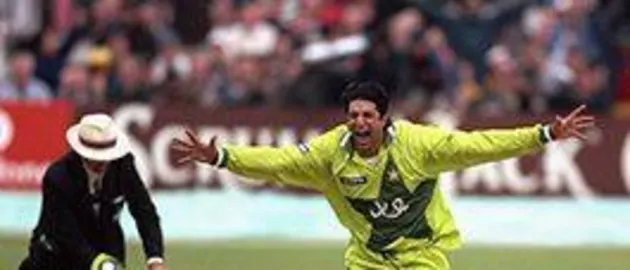?ICC Cricket World Cup Leading Wicket-Takers


1975: Gary Gilmour (Australia) – 2 matches, 24 overs, 11 wickets at 5.63, BBI 6 -14
Despite only playing two matches at the ICC Cricket World Cup 1975, Australia’s left-arm swing bowler Gary Gilmour led the wickets tally. After being 12th man throughout the preliminary matches, Gilmour was unleashed in the semi-final against England, when he collected six for 14 off 12 overs. He followed that effort with five for 48 but Australia lost the final to the West Indies. Gilmour’s scalps included Sir Viv Richards and Clive Lloyd.
1979: Mike Hendrick (England) – 5 matches, 56 overs, 10 wickets at 14.90, BBI 4-15
In his only ICC Cricket World Cup campaign, Mike Hendrick picked up 10 wickets as England reached the 1979 final on home soil against the West Indies. The right-arm swing bowler’s best figures of four for 15 off 12 overs came as England successfully defended a modest score of 165 to beat Pakistan by 14 runs. Hendrick collected three wickets in the semi-final against New Zealand, and two in England’s losing effort at Lords.
1983: Roger Binny (India) – 8 matches, 18 wickets at 18.66, BBI 4-29
Roger Binny played a starring role with the ball as India triumphed at the ICC Cricket World Cup 1983. The right-arm medium-pace bowler collected 18 wickets in total and took a wicket in all of his eight matches. Binny’s best figures of four for 29 came in a big win against Australia, when he dismissed Graeme Wood, Graham Yallop and the opposition captain David Hookes in quick succession. He also removed West Indies’ skipper Clive Lloyd in the final as India won by 43 runs.
1987: Craig McDermott (Australia) – 8 matches, 73 overs, 18 wickets at 18.94, BBI 5-44
As Australia claimed its maiden ICC Cricket World Cup in 1987, opening bowler Craig McDermott led the way, taking 18 wickets. The right-arm quickie prospered in batsmen friendly sub-continent conditions, taking four wickets against India in Chennai and five in the semi-final against Pakistan in Lahore. McDermott dismissed England opener Tim Robinson for a golden duck in the final, as Australia defended 253 for five to win by seven runs.
1992: Wasim Akram (Pakistan) – 10 matches, 89.4 overs, 18 wickets at 18.77, BBI 4-32
Pakistan’s Sultan of Swing, Wasim Akram, was the ICC Cricket World Cup 1992 leading wicket-taker and player of the final. Arguably the best left-arm bowler of all time, Akram collected 18 wickets in 10 matches as Pakistan went all the way, defeating England by 22 runs in the final at the MCG. He had Ian Botham caught behind early in England’s chase, before snaffling the wickets of Allan Lamb and Chris Lewis off successive deliveries in the middle overs.
1996: Anil Kumble (India), 7 matches, 69.4 overs, 15 wickets at 18.73, BBI 3-28
Legendary leg-spinner Anil Kumble produced a consistent performance at the ICC Cricket World Cup 1996 and finished with 15 wickets. He claimed, at least, one wicket in every match, and collected three wickets on three different occasions – against the West Indies, Kenya and Pakistan. Kumble’s three-wicket contribution was vital in India’s quarter-final win against rivals Pakistan, halting a chase of 288.
1999: Geoff Allott (New Zealand) – 9 matches, 87.4 overs, 20 wickets at 16.25, BBI 4-37and Shane Warne (Australia), 10 matches, 94.2 overs, 20 wickets at 18.05, BBI 4-29
The ICC Cricket World Cup 1999 saw a tie between New Zealand left-armer Geoff Allott and Australia leg-spinner Shane Warne – both taking 20 wickets apiece. Allott played just 31 ODIs for his country, but was a key player as New Zealand reached the semi-finals. On five occasions he took three or more wickets, including best figures of four for 37 in a win over Australia in Cardiff.
The tournament was also special for the legendary Shane Warne who led his country to World Cup triumph. Warne produced back-to-back player of the match performances, claiming four wickets in the famous tied semi-final against South Africa, and another four wickets as Australia routed Pakistan in the final.
2003: Chaminda Vaas (Sri Lanka), 10 matches, 88 overs, 23 wickets at 14.39, BBI 6-25
Sri Lanka’s Chaminda Vaas excelled in 2003, collecting 23 wickets as his country reached the semi-final stage when it lost to Australia. Vaas claimed a hat-trick with the first three balls of the match against Bangladesh, finishing with figures of six for 25. On five other occasions, he took multiple wickets, including a haul of three for 34 off 10 overs in the semi-final against Australia. The left-arm swing bowler removed Matthew Hayden and Ricky Ponting early to leave Australia in trouble at 51 for three, which recovered to 212 for seven and then restricted Sri Lanka to 123 for seven after the target had been revised to 172 in 38.1 overs.
2007: Glenn McGrath (Australia), 11 matches, 80.5 overs, 26 wickets at 13.73, BBI 3-14
The ICC Cricket World Cup 2007 proved a productive tournament for Australia’s bowlers, with Brad Hogg, Shaun Tait and Glenn McGrath all passing 20 wickets. It was McGrath who led the pack though, with 26 wickets in Australia’s third successive World Cup triumph. He took a wicket in every match, and multiple wickets in nine – with six three-wicket hauls in total. McGrath removed South Africa’s Jacques Kallis, Ashwell Prince and Mark Boucher in quick succession to orchestrate Australia’s semi-final victory.
2011: Shahid Afridi (Pakistan), 8 matches, 74.3 overs, 21 wickets at 12.85, BBI 5-16
As his country’s captain at the ICC Cricket World Cup 2011, Shahid Afridi provided a massive contribution with the ball. The Pakistan leg-spin bowler claimed 21 wickets from just eight matches, including two four-wicket and two five-wicket hauls. Afridi proved to be the difference in an early group match, claiming four for 34 to halt Sri Lanka’s chase and secure a 11-run win. He also claimed four wickets as Pakistan routed the West Indies for just 112 in the quarter-finals.


